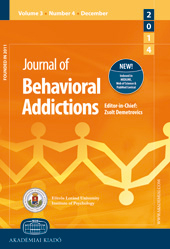Who Pays to Play Freemium Games? The Profiles and Motivations of Players Who Make Purchases Within Social Casino Games
Who Pays to Play Freemium Games? The Profiles and Motivations of Players Who Make Purchases Within Social Casino Games
Author(s): Daniel L. King, Sally M. Gainsbury, Alex M.T. Russell, Paul H. DelfabbroSubject(s): Media studies, Behaviorism, Crowd Psychology: Mass phenomena and political interactions, Substance abuse and addiction, Social Informatics
Published by: Akadémiai Kiadó
Keywords: social casino games; social network sites; gambling; freemium; addiction; social media;
Summary/Abstract: Social casino games (SCGs) feature gambling themes and are typically free to download and play with optional in-game purchases. Although few players spend money, this is sufficient to make them profitable for game developers. Little is known about the profile and motivations of paying players as compared to non-paying players. Methods: This study compared the characteristics of 521 paying and non-paying Australian social casino game players who completed an online survey. Results: Paying players were more likely to be younger, male, speak a non-English language, and have a university education than non-payers. Paying players were more likely to be more highly involved in SCG in terms of play frequency and engagement with games and emphasized social interaction more strongly as a motivation for playing. A cluster analysis revealed distinct subgroups of paying players; these included more frequent moderate spenders who made purchases to avoid waiting for credits and to give gifts to friends as well as less frequent high spenders who made purchases to increase the entertainment value of the game. Discussion: These findings suggest that paying players have some fundamental differences from non-paying players and high spenders are trying to maximize their enjoyment, while non-spenders are content with the game content they access. Conclusions: Given the structural similarities between SCG and online gambling, understanding subgroups of players may have broader implications, including identifying characteristics of gamers who may also engage in gambling and players who may develop problems related to excessive online gaming.
Journal: Journal of Behavioral Addictions
- Issue Year: 5/2016
- Issue No: 2
- Page Range: 221-230
- Page Count: 10
- Language: English

